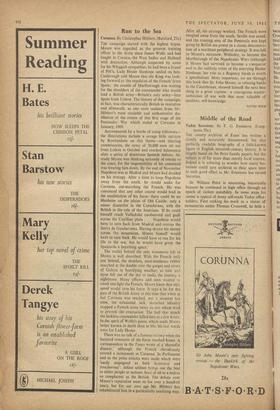Run to the Sea
Corunna. By Christopher Hibbert. (Batsford, 21s.) campaign started with the highest hopes. Moore was regarded as the greatest training officer in the Army since James Wolfe and had fought in Corsica, the West Indies and Holland with distinction. Although suspected by some for his Whiggish sympathies, he had been a friend of Pitt's; Lady Hester Stanhope smiled on him. Castlereagh told Moore that the King was look- ing forward to 'the expulsion of the French' from
Spain : the mantle of Marlborough was waiting for the shoulders of the commander who would lead a British army—Britain's only army—into
Spain from Lisbon. The history of the campaign, in fact, was characteristically British in execution and aftermath, as one soon realises from Mr. Hibbert's most readable and authoritative dis- tillation of the events of this first stage of the Peninsular War which ended at Corunna in January, 1809.
Accompanied by a horde of camp followers— the illustrations include a savage little cartoon by Rowlandson on this theme—and thieving commissaries, the army of 20,000 men set out from Lisbon in October and reached Salamanca after a series of disastrous Spanish defeats. Al- ready Moore was thinking seriously of retreat to the coast, for the responsibility of his command was wearing him down. By the end of November Napoleon was at Madrid and Moore had decided on his strategy. After a feint to keep Napoleon away from the south, he would make for Corunna, out-marching the French. He was convinced that any other course would lead to the annihilation of his force; there could be no Blenheim on the plains of Old Castile, only a minor Austerlitz in the Cantabrians, with the British in the role of the Austrians. 'If he could himself reach Valladolid unobserved and push across the Castilian plain . . . Napoleon would have to turn back from Madrid and recross the Sierra de Guadarrama. Having drawn his enemy across the mountains, Moore himself would have to turn back. He would have to run for his life to the sea; but he would have given the Spaniards a breathing space.'
The reality behind the only manoeuvre left to Moore is well described. With the French only just behind, the drunken, semi-mutinous rabble marched at the double over the gorges and rivers of Galicia in horrifying weather, as rain and snow fell out of the sky to make, the journey a nightmare. Many officers and men wanted to stand and fight the French; Moore knew that ohly speed would save his force. It says a lot for the guts of the British Army at this time that when at last Corunna was reached, not a moment too soon, the exhausted, sick, drenched infantry stopped a French army twice its sire which tried to prevent the evacuation. The ball that struck the luckless commander killed him in a few hours. In the spirit of Wolfe's poem, which made Moore better known in death than in life. his last words were for Lady Hester, There was no talk of a famous victory when the battered remnants of the force reached home. A correspondent in the Times wrote of a 'shameful disaster,' although the French chivalrously erected a monument in Corunna. In Parliament and in the press attacks were made which were 'easily impugned as both hysterical and treacherous': defeat seldom brings out the best in either people or nations, least of all in a nation so complacent as the British. The debate over Moore's reputation went on for over a hundred years, but for our own age Mr. Hibbert has rehabilitated him in a particularly satisfying way.
After all, his strategy worked. The French were tempted away from the south, Seville was saved, and the running sore of the Peninsula was kept going by British sea power in a classic demonstra- tion of a maritime peripheral strategy. It was left to Moore's successor, Wellesley, to become the Marlborough of the Napoleonic Wars (although if Moore had survived to become a conqueror and in the unlikely event of his marrying Hester Stanhope, her role as a Regency Sarah is worth a speculation). More important, we see through this book that Sir John Moore, in refusing battle in the Cantabrians, showed himself the next best thing to a great captain : a courageous master- technician of war with that most valuable of qualities, self-knowledge.
DAVID aum:s


































 Previous page
Previous page